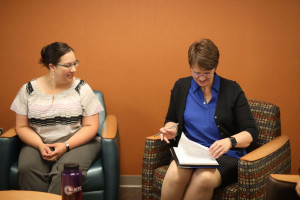Article originally published in the WSCA Newsletter, April 2021
There are so many services available to Wisconsin’s middle, high school and technical college students throughout their education, many of which are provided by middle and high school counselors. But getting in front of students is a challenge, much less scheduling time and engaging students. In the spirit of collaboration and cooperation for the students, all of us who work for the technical colleges and consider ourselves advocates play a part in student success. This is especially true when our work provides valuable services to students in all stages of their education. In that vein, it’s never too early to refer students to the Career and Employment Services (CES) department at Wisconsin’s technical colleges.
For all types of students

The CES department does much more than helping graduates find work. A CES Advisor explained that Students should consider the CES department at all points in their journey – including in middle and high school while exploring career pathways. Also, when they explore careers before enrolling, finding a part-time job or internship, to help finding a full-time job after graduating and even as an alumnus – we are here to assist.”
A common goal: student retention and success
Just as all student influencers – parents, grandparents, school counselors and instructors – want to support young people’s success, a CES team member can advise a student or potential student about all aspects of potential career selection. They even have services for middle and high school students that can support what Wisconsin’s school counselors are doing with students to help explore career pathways at the college the student is considering.
Unique challenges in a unique time
Helping inform students about what to expect – in terms of cost, time required, outcomes and other matters is especially important when everything else is uncertain. As CES staff, we advise students when certain programs may require additional steps and/or expenses needed for enrollment. For example, certain public safety or education programs may require a background check. In some cases, the program may require the purchase of certain tools or supplies over and above tuition that could add to the expense. Advisors can alert students to potential challenges they might face in the job but also successful outcomes they could enjoy. This process can help build students’ confidence that the program may be right for them. For younger students, it also helps them focus on what they can do now to ensure their future success. It's a holistic approach, where we serve undecided students and students who have solid, clear career paths, plus anyone in between. We help students overcome barriers to employment such as academic, financial, disability, single parent, ELL (English Language Learners) unemployed and non-traditional employment.”

Advisors and CES staff understand potential challenges students may have and can help them navigate ways to overcome challenges. Non-traditional employment may help women pursue careers they are passionate about. If their gender makes them a minority in that program, they can try to prepare for that and seek mentors or other help to overcome any challenges related to that. The same can be said for men who want a career traditionally held by women, so they can also navigate potential challenges. These are just a few reasons why students benefit from seeking advising early on.
For students uncertain what their options are or what career path to take, advisors can help them explore careers through career quizzes and interest tests. There are many tools to help focus the students in their search.
Career advising for a virtual age
Advising might also include resume writing and interview assistance. As a student progresses in their program, teachers often advise them to seek internships and other relevant opportunities for job experience. For postsecondary students and perhaps even some high school students, the CES staff can often help students locate and apply for internships. CES staff are also a great resource for learning about campus jobs, called Work Study or Student Help, which pay well above median wage and can be very helpful to students who want to work while enrolled in classes.
The department is very interested in meeting the student’s needs by helping them understand their interests, values, strengths and maybe even shortcomings. Sometimes it's a journey, but one that we can work together on.” The CES team is linked up with many other student services at the college, so they can make recommendations or referrals for students when appropriate. This dedicated department at all Wisconsin Technical Colleges is important for student retention as much as for student success.
![]()
Help evolves with students’ needs
The CES department adds tools based on changing student needs. It recently added two new resources one called Focus 2 for career exploration and Handshake, for job searching. Handshake is free to students to seek opportunities online and reach out to potential employers. Its focus includes entry level jobs for new graduates. It also connects employers to students or graduates of particular programs. Handshake also offers virtual career planning, job fairs, and promotes conferences relevant to job seekers. These tools can help make the difference between a student taking a job and finding a fulfilling and successful career.
The technical colleges also provide access to a “WorkSmart Network” for individuals who have been laid off or are unemployed seeking new opportunities. Collaborating with the state’s Workforce Development Board, many of the same services available to enrolled students are offered, but these specific advisors work closely with local employers. They may connect students to local companies struggling to hire the staff for certain positions. As many advisors are conducting triage for friends and acquaintances who may be struggling with job or financial pressures, consider your technical college’s CES department. To secure help for middle, high school, college or potential students at various points in their career, please also consider your local technical college’s Career and Employment Services.